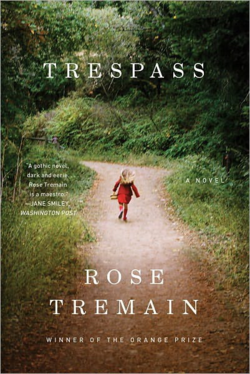
If you left your own country, if you left it late, and made your home in someone else's country, there was always a feeling that you were breaking an invisible law, always the irrational fear that, one day, some 'rightful owner' would arrive to take it all away, and you would be driven out . .
So muses Veronica Verey, after a personal disaster makes her reassess her decision to move to the beautiful, wild, mountainous Cevennes in central south France. For this is a novel with a backdrop of expat life, a life which turns out very badly for all the people concerned. They are Veronica, a garden designer, her partner Kitty, a mediocre watercolourist, and Anthony, Veronica's antique dealer brother. Anthony has been hit hard by the recession, and his exclusive Pimlico shop is no longer making money. So he decides to cash in his London life and follow his beloved sister to France, where he almost immediately falls in love with the Mas Lunel, a dilapidated but unquestionably beautiful farmhouse with glorious views all round.
But nothing is a simple as it may seem to Anthony, who immediately starts to imagine stripping the place down, restoring the old beams, putting in all his glorious furniture. The Mas is owned by Aramon Lunel, a decaying alcoholic in his sixties, who has neglected the house and its vineyards but is desperate for the nearly half a million euros the estate agent tells him it is worth. The problem is Aramon's sister Audrun, who lives in a jerry built bungalow on the edge of the property and owns the wondeful wild forest adjoining. Anthony won't buy if the bungalow remains, Audrun is determined never to move.
The relationships between these two pairs of siblings are explored with great delicacy, and the roots of their evident problems slowly emerge. The Vereys suffered terribly from the neglect and strangeness of their beautiful socialite mother -- Anthony's happiest memory remains one of an exquisite afternoon when she came and had tea in his tree house -- but that has resulted in a great closeness between them which drives Kitty to fury and despair. The Lunels, though, have a terrible dark past of incest, a past which has blighted both their lives -- Aramon because he is eaten up by guilt, Audrun because she cannot forgive him for making her unable to give herself to the man who has always loved her.
This truly is a novel of the dark side of expat life. The French hate the British and the British fail totally to understand the French. Even the beauty of the surroundings is menacing -- the terrifying corniche roads that wind around the gorges of the Tarn claim many lives every year, fires start up and destroy buildings and vegetation, the endless dry summers make it hard to grow anything, let alone create the sort of beautiful gardens that Veronica designs. Foreigners buy beautiful remote houses and then put them back on the market when they find themselves spending their summers in total isolation, their friends unable to face the trying and dangerous drive to visit them.
I'm an expat myself, and I know it's not all wine and roses (in fact I've written a book myself which shows some of the pitfalls), but I have to say this seemed a pretty gloomy view. Having recently read one of Tremain's earlier novels, I was surprised by how dark this one was. I've seen the conclusion described as redemptive, but really the impression left on me was one of desperately sad lives, of people longing for love and failing to find it.
I have to add my little quibble, too -- the plot hinges partly on the fact that Aramon has inherited the farmhouse and land, and his sister has been left the forest and the little strip of land where she built the bungalow. But this could not happen. French law is absolutely rigid on the fact that siblings must inherit equally -- you can't cut any child out of your will. So in reality, Audrun would be the joint owner of the Mas. Oh well -- dramatic license, I suppose, but the sort of thing that can annoy people (fussy ones like me, anyway).
I hope I'm not giving the impression that this is a bad book, because it absolutely isn't. Just not a very cheerful one.
